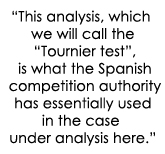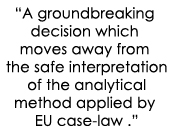 Competition and collecting societies: a special application of European legal doctrine in Spain.
Competition and collecting societies: a special application of European legal doctrine in Spain.
“It seems to utilise the previous methods in a forced manner, even though those methods had led to very different conclusions on a European level.”
In a recent decision by the Spanish Market and Competition Commission (CNMC), once again penalising SGAE with a fine of 3.1 million Euros for demanding an excessive fee for concert licensing, an attempt was made to apply European doctrine.
The decision is particularly interesting because the Spanish competition authority has interpreted European legal doctrine on the method of analysing the fairness of a fee and does so with a personal touch that has led to special features in respect of how it is applied. It will no doubt serve to confirm the expectations generated by its previous 2009 report, but which will also lead to considerable uncertainty should this line of interpretation become established.
 In Europe, collective management of copyright in musical works used in concerts is characterised by the absence of competition. Broadly speaking, each collecting society is the only licence provider in its country.
In Europe, collective management of copyright in musical works used in concerts is characterised by the absence of competition. Broadly speaking, each collecting society is the only licence provider in its country.
The SGAE’s fee for concert licences is generally fixed at 10% of the amount generated by ticket sales, and the grant of the licence is subject to a series of conditions. This system prompted a complaint by the concert organisers’ association (APM) in 2005, which has finally been concluded in November 2014 confirming that the society’s fee was abusive.
Of the numerous questions raised by the Spanish authority’s proceedings in respect of European case-law, the following are of particular note:
(1) the less stringent criteria than those applied by the CJEU in order to detect abuse;
(2) the assessment of the reciprocal representation agreements; and
(3) the equal treatment to all repertoires and even;
(4) the application of the source fee or the country-of-use fee.
The Court of Justice of the European Union (CJEU) set out criteria for analysing the fairness of a price charged by a collecting society in its judgments of 13 July 1989, Tournier [Case C-395/87] and Lucazeau [Case C-110/88, C-241/88 and C-242/88].
In these cases, the CJEU, accepted the proposal by the French courts, namely, to compare the fees charged by collecting societies in order to detect whether there is an abnormally high price.
This analysis, which we will call the ‘Tournier test’ is what the Spanish competition authority has essentially used in the case under analysis here.
We should first of all look at the particular interpretation of the criteria used by Community case-law in order to apply the Tournier test. Until now, the test proved positive where the fees under examination were “appreciably higher than those charged in other Member States” (CJEU’s decision of 27 February 2014, C-351/12). In this case, however, the comparative analysis does not yield a result in which the fee is clearly more expensive than the fee applied in “the majority of the Member States” (p 5455 of the decision).
Taking this into account and in order to reach its decision, the Court conducted the Tournier test, not taking the fees of all of the European collecting societies as a reference point, but rather taking the reference point to be the fees charged by the society whose repertoire prevails in the Spanish concert sector.
The supervisory body drew attention to the fact that SGAE’s concert fee triples that charged by the British collecting society (3%) for the same use. The decision indicates that this difference is highly significant.
The Spanish competition authority looks at the combined action of the high Spanish fee and the reciprocal representation agreements which ensure that British authors whose rights are managed by the society receive the same treatment preventing any direct licensing.
 The Spanish competition authority considers that the effect that reciprocal representation agreements have on the dominant position of collecting societies requires the society to be particularly responsible with respect to its fee conduct, and it calls into question the society’s equal treatment to rightholders regardless of origin and the application of the country-of-use fee.
The Spanish competition authority considers that the effect that reciprocal representation agreements have on the dominant position of collecting societies requires the society to be particularly responsible with respect to its fee conduct, and it calls into question the society’s equal treatment to rightholders regardless of origin and the application of the country-of-use fee.
Based on this assessment, the decision considers that SGAE is not acting in conformity with the special responsibility that it holds due to its monopolist position by failing to justify the difference between its fee and the British fee, and by maintaining prices that hinder the emergence of competitors on the Spanish market.
Although the decision does not go into the issue of the price to be applied, the source fee or the country-of-destination fee, it is worth reflecting a little on that issue. It is clear that one of the unfinished debates affecting the collecting societies’ practice concerns the fee for extra-territorial licences (in countries other than the one in which the collecting society is based), regardless of whether or not they are multi-territorial (for use that takes place in several countries, with the internet being the prototypical case here).
This is a groundbreaking decision which moves away from the safe interpretation of the analytical method applied by EU case-law and is very critical of the network effect of reciprocal representation agreements, but which, instead of exploring new analytical methods to support its decision, seems to utilise the previous methods in a forced manner, even though those methods had led to very different conclusions on a European level.
PH
APM v. SGAE, Spanish Market and Competition Commission(CNMC), 6th November 2014
A more complete analysis of this decision is available in the Wolters Kluwer Copyright Case Database.
_____________________________
To make sure you do not miss out on regular updates from the Kluwer Copyright Blog, please subscribe here.
Kluwer IP Law
The 2022 Future Ready Lawyer survey showed that 79% of lawyers think that the importance of legal technology will increase for next year. With Kluwer IP Law you can navigate the increasingly global practice of IP law with specialized, local and cross-border information and tools from every preferred location. Are you, as an IP professional, ready for the future?
Learn how Kluwer IP Law can support you.


